Please fill out the following information, and RRFC Admissions will contact you to discuss our program offerings:
Issue #203
by Liya Swift
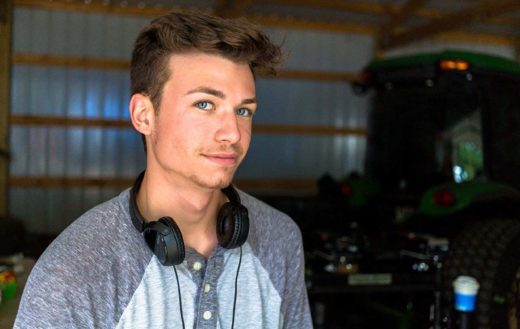 Like many of our emerging filmmakers, Dakota Martin found the Film Connection when faced with the choice of pursuing a career in a particular field.
“I was just about to graduate high school, and I didn’t know whether a university or a trade school was more the right choice for me. My stepmom and I started looking around, and she actually found the school and showed me about it. I kind of just instantly knew, ‘Oh yeah, this seems like more of a fit for me than a film program at a university, just because this is more hands-on with everything and you’re actually out there.’”
Having taken a number of Video Production courses in high school, Dakota knew more than other apprentices who enter the program completely green. Nevertheless, his education was by no means complete. His mentor, cinematographer, editor, producer Darko Nikolich was able to assess where Dakota was at and to customize the curriculum to meet him at his level.
“We basically picked up right from what I didn’t know and then went on from there. He was super good at assessing what I knew and what I didn’t know… He’s been showing me cinematography and editing and just everything that he can imagine… Being able to ask any question that comes to mind is such a big help. I’m a super big fan of questions, too. So I’m always asking him stuff, just anything that comes to mind. He’s super cool about answering. There are no stupid questions to him.”
And Dakota’s externship even resulted in getting hired at KTNV, Channel 13 Action News in Las Vegas! It all started with a casual conversation between Dakota and his mentor Darko.
“I was talking to [Darko] and I mentioned how, at the time, I was working construction for my dad. So 40 hours a week of hard manual labor, and I was just like, ‘Yeah, man, I’m looking for something new. I don’t know how much longer I can do this.’ And then he kind of disappeared for five minutes while the news was going on, and then we walked outside, and I was about to get in my car to go home, and he said, ‘Look, there might be an opening here.’… And I was just so happy. It was incredible. I started smiling crazy hard. I thought that would be great.”
Since landing the job as a studio tech at Action News, Dakota has remained committed to doing a great job each and every day.
Like many of our emerging filmmakers, Dakota Martin found the Film Connection when faced with the choice of pursuing a career in a particular field.
“I was just about to graduate high school, and I didn’t know whether a university or a trade school was more the right choice for me. My stepmom and I started looking around, and she actually found the school and showed me about it. I kind of just instantly knew, ‘Oh yeah, this seems like more of a fit for me than a film program at a university, just because this is more hands-on with everything and you’re actually out there.’”
Having taken a number of Video Production courses in high school, Dakota knew more than other apprentices who enter the program completely green. Nevertheless, his education was by no means complete. His mentor, cinematographer, editor, producer Darko Nikolich was able to assess where Dakota was at and to customize the curriculum to meet him at his level.
“We basically picked up right from what I didn’t know and then went on from there. He was super good at assessing what I knew and what I didn’t know… He’s been showing me cinematography and editing and just everything that he can imagine… Being able to ask any question that comes to mind is such a big help. I’m a super big fan of questions, too. So I’m always asking him stuff, just anything that comes to mind. He’s super cool about answering. There are no stupid questions to him.”
And Dakota’s externship even resulted in getting hired at KTNV, Channel 13 Action News in Las Vegas! It all started with a casual conversation between Dakota and his mentor Darko.
“I was talking to [Darko] and I mentioned how, at the time, I was working construction for my dad. So 40 hours a week of hard manual labor, and I was just like, ‘Yeah, man, I’m looking for something new. I don’t know how much longer I can do this.’ And then he kind of disappeared for five minutes while the news was going on, and then we walked outside, and I was about to get in my car to go home, and he said, ‘Look, there might be an opening here.’… And I was just so happy. It was incredible. I started smiling crazy hard. I thought that would be great.”
Since landing the job as a studio tech at Action News, Dakota has remained committed to doing a great job each and every day.
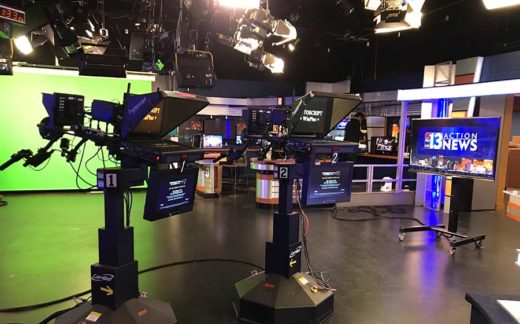 “It’s going great. I don’t mean to toot my own horn or anything, but I’ve actually received a lot of compliments for being on-point. I floor direct and I operate the teleprompter for the live news, the 3:00, the 5:00, 6:00, and then the 11:00 [shows]…There have been a couple of times where the anchors are like, ‘You’re doing a great job. You’re so into it and ahead of the game.’ So it’s really cool, for sure. It feels great. It feels like I’m doing something right.”
While Dakota is grateful to be getting paid while building hands-on industry experience, he isn’t forgetting about his long term goal of being a film director. And, he’s been surprised to unearth a new love—screenwriting.
“The main goal is to direct movies. And what I want to do is go out to California and get hired by a production company and start doing their projects and work for them, and I also want to keep writing in the meantime, because I was never a big writer, but once I started Film Connection and they had me do the scriptwriting, I kind of fell in love with it. It’s actually really awesome to me. So yeah, I want to stick with that, too.”
Dakota credits his screenwriting mentor Eric Abrams (Married with Children, Liv and Maddie) for demystifying the process of writing a screenplay.
“I dreaded writing before this school. I just didn’t know how to articulate the thoughts and the events in an organized way. So it would always get off-track. Then I started the scriptwriting process with Film Connection, and we basically went through a whole outline for three weeks. I spent a week writing out each act and the action that took place in the acts, and then from there we went over it and made sure it was all good, and it was basically my outline for the entire script. And then from there I wrote the script with the actual dialogue and the movements. It was just so much more organized and so much easier to do, and it all played out so much better. So I just kind of love it now. It’s like my child, my script…”
Dakota knows how fortunate he is to have a strong support system behind him, helping him on his way.
“My dad, he’s the one that gave me the idea in the first place, and then my stepmom found the school. And my mom, she’s still been there every step of the way, trying to help me out and supporting me…
They’re ridiculously happy for me. They’ve been constantly telling me how proud of me they are. Actually, my stepmom has a career day for her school, and she invited me down to come talk about it.”
At 18 years of age, Dakota’s got a job and a script under his belt prior to graduation and he’s building his skillset and experience day-by-day in preparation for the trek ahead.
So what’s his advice for other Film Connection students on how they can make the most their time in the program?
“I say just stick with it. Don’t give up on something if it’s really what you want to do. There’s always going to be something out there. Me, I got it really quickly, which is awesome, but it takes time. You have to put in the work for it.”
“It’s going great. I don’t mean to toot my own horn or anything, but I’ve actually received a lot of compliments for being on-point. I floor direct and I operate the teleprompter for the live news, the 3:00, the 5:00, 6:00, and then the 11:00 [shows]…There have been a couple of times where the anchors are like, ‘You’re doing a great job. You’re so into it and ahead of the game.’ So it’s really cool, for sure. It feels great. It feels like I’m doing something right.”
While Dakota is grateful to be getting paid while building hands-on industry experience, he isn’t forgetting about his long term goal of being a film director. And, he’s been surprised to unearth a new love—screenwriting.
“The main goal is to direct movies. And what I want to do is go out to California and get hired by a production company and start doing their projects and work for them, and I also want to keep writing in the meantime, because I was never a big writer, but once I started Film Connection and they had me do the scriptwriting, I kind of fell in love with it. It’s actually really awesome to me. So yeah, I want to stick with that, too.”
Dakota credits his screenwriting mentor Eric Abrams (Married with Children, Liv and Maddie) for demystifying the process of writing a screenplay.
“I dreaded writing before this school. I just didn’t know how to articulate the thoughts and the events in an organized way. So it would always get off-track. Then I started the scriptwriting process with Film Connection, and we basically went through a whole outline for three weeks. I spent a week writing out each act and the action that took place in the acts, and then from there we went over it and made sure it was all good, and it was basically my outline for the entire script. And then from there I wrote the script with the actual dialogue and the movements. It was just so much more organized and so much easier to do, and it all played out so much better. So I just kind of love it now. It’s like my child, my script…”
Dakota knows how fortunate he is to have a strong support system behind him, helping him on his way.
“My dad, he’s the one that gave me the idea in the first place, and then my stepmom found the school. And my mom, she’s still been there every step of the way, trying to help me out and supporting me…
They’re ridiculously happy for me. They’ve been constantly telling me how proud of me they are. Actually, my stepmom has a career day for her school, and she invited me down to come talk about it.”
At 18 years of age, Dakota’s got a job and a script under his belt prior to graduation and he’s building his skillset and experience day-by-day in preparation for the trek ahead.
So what’s his advice for other Film Connection students on how they can make the most their time in the program?
“I say just stick with it. Don’t give up on something if it’s really what you want to do. There’s always going to be something out there. Me, I got it really quickly, which is awesome, but it takes time. You have to put in the work for it.”
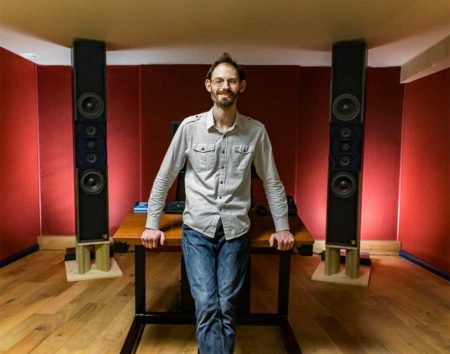 London-based Recording Connection mentor Dax Liniere has an impressive repertoire that spans hard rock, to pop, to world and indie, and more. The multi-award-winning record producer and mixer believes stellar music production shouldn’t be about one rigid way of doing things; great production should meet the needs of the music and motives of the artist.
Dax looks forward to training the next generation of audio engineers and producers at his newly opened Puzzle Factory Sound Studios, located just 15 minutes from the center of London. Also a columnist for AudioTechnology Magazine, he’s studied with a number of the greats including Alan Moulder, Michael Brauer, Joe Chiccarelli and Flood.
Below are a few choice excerpts from our recent conversation with Dax along with some valuable drum micing tips to put into practice. Enjoy!
London-based Recording Connection mentor Dax Liniere has an impressive repertoire that spans hard rock, to pop, to world and indie, and more. The multi-award-winning record producer and mixer believes stellar music production shouldn’t be about one rigid way of doing things; great production should meet the needs of the music and motives of the artist.
Dax looks forward to training the next generation of audio engineers and producers at his newly opened Puzzle Factory Sound Studios, located just 15 minutes from the center of London. Also a columnist for AudioTechnology Magazine, he’s studied with a number of the greats including Alan Moulder, Michael Brauer, Joe Chiccarelli and Flood.
Below are a few choice excerpts from our recent conversation with Dax along with some valuable drum micing tips to put into practice. Enjoy!
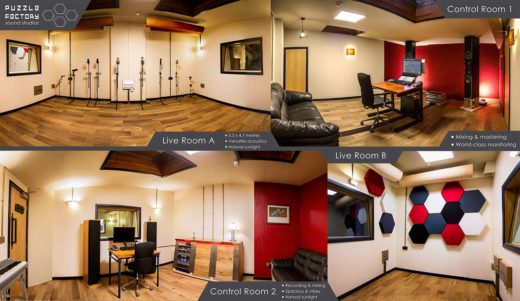 RRFC: As someone who’s lectured at traditional audio schools, what do you appreciate about Recording Connection’s approach to in-studio training?
Dax: One of the problems with the traditional style of audio courses, is that they go over all the theoretical stuff, but miss the mark when it comes to practical experiences. They teach you how a compressor is intended to work, but they never teach you how to actually use one…
If I’d had someone who could have listened to my mixes, and said, ‘Yeah, that’s good, but you could improve this part. No, you need to rework your kick drum, more like this. Your vocals need to stand out more, cut this frequency,’ whatever it may happen to be, I know that I would have gotten to where I am much sooner. This makes one-to-one education arguably more relevant, especially in these times of rapid change.
RRFC: Being a drummer yourself, could you share some drum micing techniques that work for you?
Dax: The most important thing, before anything else, is tuning the drum kit. Learning how to tune a drum kit is an invaluable skill for any studio engineer. It’s one of those things, again, that I’ve never seen taught at an audio engineering school, and it’s paramount. More drummers than you’d expect, regardless of their playing skill, don’t really know how to tune a drum kit for the studio. I can tell you about mic choices or positions, but what it really comes down to is preparing the instrument, whatever it happens to be, and then listening to it in the room. Does it sound right before you even put a microphone on it? Because if it doesn’t sound good in the room, putting a microphone on it is only going to amplify that… So get the instrument sounding as great as possible first, then go from that point.
One quick tip, I think people often mistakenly tune toms way too high. Keep them out of dogs’ hearing range. [On a] cardioid pattern microphone you have a lobe of rejection at the back of the microphone. You can use this to your advantage. You don’t just want to point the microphone at the thing you want to capture, you also want to point the back of the microphone at the thing you don’t want to capture. So in the case of micing up a snare drum, for example, you don’t want too much hi-hat spill into that microphone. So what you can do is position the mic in such a way that the front of the mic is pointing towards the snare drum, but the back of the mic is pointing towards the hi-hats. By doing that, you’ll give yourself much less spill [and] isolate the bleed a lot more.
A lot of people put a kick drum mic just outside or in-line with the head of the drum. I’m actually a big fan of putting the kick mic inside the drum. Actually, I’ve built a custom stand to be able to get right inside the kick drum. You can get some really great sounds that way, as long as you damp the drum down first. You don’t want it to be too live inside or it sounds like a basketball.
RRFC: What do you look for in potential apprentices/externs?
Dax: Number 1: Attitude. This encapsulates, ‘Are they truly willing to learn, are they enthusiastic, are they motivated, are they self-directed, can they be a part of a team, can they make things happen themselves, and are they observant?’ That’s another big one. Are they paying attention to what’s going on around them? That’s one of the essential traits for any studio assistant, or for any vocation, for that matter.
Want to train with Dax Liniere in London? Learn more.
RRFC: As someone who’s lectured at traditional audio schools, what do you appreciate about Recording Connection’s approach to in-studio training?
Dax: One of the problems with the traditional style of audio courses, is that they go over all the theoretical stuff, but miss the mark when it comes to practical experiences. They teach you how a compressor is intended to work, but they never teach you how to actually use one…
If I’d had someone who could have listened to my mixes, and said, ‘Yeah, that’s good, but you could improve this part. No, you need to rework your kick drum, more like this. Your vocals need to stand out more, cut this frequency,’ whatever it may happen to be, I know that I would have gotten to where I am much sooner. This makes one-to-one education arguably more relevant, especially in these times of rapid change.
RRFC: Being a drummer yourself, could you share some drum micing techniques that work for you?
Dax: The most important thing, before anything else, is tuning the drum kit. Learning how to tune a drum kit is an invaluable skill for any studio engineer. It’s one of those things, again, that I’ve never seen taught at an audio engineering school, and it’s paramount. More drummers than you’d expect, regardless of their playing skill, don’t really know how to tune a drum kit for the studio. I can tell you about mic choices or positions, but what it really comes down to is preparing the instrument, whatever it happens to be, and then listening to it in the room. Does it sound right before you even put a microphone on it? Because if it doesn’t sound good in the room, putting a microphone on it is only going to amplify that… So get the instrument sounding as great as possible first, then go from that point.
One quick tip, I think people often mistakenly tune toms way too high. Keep them out of dogs’ hearing range. [On a] cardioid pattern microphone you have a lobe of rejection at the back of the microphone. You can use this to your advantage. You don’t just want to point the microphone at the thing you want to capture, you also want to point the back of the microphone at the thing you don’t want to capture. So in the case of micing up a snare drum, for example, you don’t want too much hi-hat spill into that microphone. So what you can do is position the mic in such a way that the front of the mic is pointing towards the snare drum, but the back of the mic is pointing towards the hi-hats. By doing that, you’ll give yourself much less spill [and] isolate the bleed a lot more.
A lot of people put a kick drum mic just outside or in-line with the head of the drum. I’m actually a big fan of putting the kick mic inside the drum. Actually, I’ve built a custom stand to be able to get right inside the kick drum. You can get some really great sounds that way, as long as you damp the drum down first. You don’t want it to be too live inside or it sounds like a basketball.
RRFC: What do you look for in potential apprentices/externs?
Dax: Number 1: Attitude. This encapsulates, ‘Are they truly willing to learn, are they enthusiastic, are they motivated, are they self-directed, can they be a part of a team, can they make things happen themselves, and are they observant?’ That’s another big one. Are they paying attention to what’s going on around them? That’s one of the essential traits for any studio assistant, or for any vocation, for that matter.
Want to train with Dax Liniere in London? Learn more.
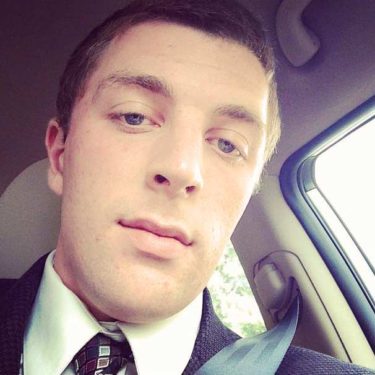 Congrats to Radio Connection student Robert Gilmore (Doylestown, PA) on getting hired at a Pennsylvania radio station. He’s on-air and getting paid for it. We’ll have more on this in an upcoming issue. Upon starting Radio Connection, Robert wrote in his blog: “I am very excited to begin this new chapter in my life, and I see this as a spectacular opportunity that I am ready to make the most of. The road to the top of the sports radio industry begins now!”
Congrats to Radio Connection student Robert Gilmore (Doylestown, PA) on getting hired at a Pennsylvania radio station. He’s on-air and getting paid for it. We’ll have more on this in an upcoming issue. Upon starting Radio Connection, Robert wrote in his blog: “I am very excited to begin this new chapter in my life, and I see this as a spectacular opportunity that I am ready to make the most of. The road to the top of the sports radio industry begins now!”
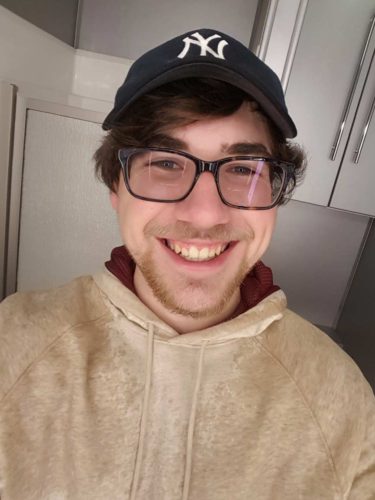 Film Connection student Jason Reinhardt (Atlanta, GA) had the supreme privilege of PA’ing on Black Panther—the very same movie that’s taking the world by storm—now!
Speaking of his experience, Jason says, “Well I PA’d for about a week on Black Panther. They were doing re-shoots down in rural Georgia. I was hired on as a catering P.A… [But] catering wasn’t my only job. My first day I ended up being assigned to lockup on a dirt road, which was about as fun as starring at a dirt road for 8 hours (but hey I was on a Marvel shoot)…When I wasn’t doing that I was a set PA and a busy one. Each day I clocked around 15 miles on foot. I met actors, doubles and stunt [pros]…The specific scenes we shot over my time there involved a lot of extras, who had to do a lot of running…I got on good terms with the main villain when he needed cough drops and I was there with a handful. I actually met large majority of the cast including…all of the warriors who protect the king (they wear red uniforms), the main villain, Black Panther [Chadwick Boseman] himself, all of the stunt doubles and all of the stand-ins…Overall, the days where a blast. I learned a lot, met a lot of amazing people and got to work on my first large scale set!”
Film Connection student Jason Reinhardt (Atlanta, GA) had the supreme privilege of PA’ing on Black Panther—the very same movie that’s taking the world by storm—now!
Speaking of his experience, Jason says, “Well I PA’d for about a week on Black Panther. They were doing re-shoots down in rural Georgia. I was hired on as a catering P.A… [But] catering wasn’t my only job. My first day I ended up being assigned to lockup on a dirt road, which was about as fun as starring at a dirt road for 8 hours (but hey I was on a Marvel shoot)…When I wasn’t doing that I was a set PA and a busy one. Each day I clocked around 15 miles on foot. I met actors, doubles and stunt [pros]…The specific scenes we shot over my time there involved a lot of extras, who had to do a lot of running…I got on good terms with the main villain when he needed cough drops and I was there with a handful. I actually met large majority of the cast including…all of the warriors who protect the king (they wear red uniforms), the main villain, Black Panther [Chadwick Boseman] himself, all of the stunt doubles and all of the stand-ins…Overall, the days where a blast. I learned a lot, met a lot of amazing people and got to work on my first large scale set!”

RRFC is education upgraded for the 21st century.
Get the latest career advice, insider production tips, and more!
Please fill out the following information, and RRFC Admissions will contact you to discuss our program offerings:
Stay in the Loop: Subscribe for RRFC news & updates!
© 2025 Recording Radio Film Connection & CASA Schools. All Rights Reserved.


